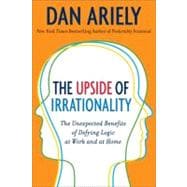
| Introduction: Lessons from Procrastination and Medical Side Effects | |
| Hepatitis and procrastination | |
| The movie treatment | |
| What we should do and behavioral economics | |
| From food to incompatible design | |
| Taking irrationality into account | p. 1 |
| The Unexpected Ways We Defy Logic at Work | |
| Paying More for Less: Why Big Bonuses Don't Always Work | |
| Of mice and men, or how high stakes affect rats and bankers | |
| Measuring the effects of a CEO-sized bonus in India | |
| Loss aversion: why bonuses aren't really bonuses | |
| Working under stress: just how clutch are "clutch" NBA players? | |
| Stage fright and the social side of high stakes | |
| Making compensation work for society | p. 17 |
| The Meaning of Labor: What Legos Can Teach Us about the Joy of Work | |
| You are what you do: identity and labor | |
| The pains of wasted work | |
| Lessons from a parrot-and some hungry rats | |
| Searching for meaning while playing with Legos | |
| Making work matter again | p. 53 |
| The IKEA Effect: Why We Overvalue What We Make | |
| Why IKEA makes us blush (with pride) | |
| Cooking lessons: finding a balance between just adding water and baking an apple pie from scratch | |
| The real value of a thousand origami cranes (and frogs) | |
| Customize it! | |
| Why "almost done" doesn't do much for us | |
| Why we need labors of love | p. 83 |
| The Not-Invented-Here Bias: Why "My" Ideas Are Better than "Yours" | |
| Mark Twain describes a universal form of stupidity | |
| "Anything you can do I can do better": why we favor our own ideas | |
| The toothbrush theory | |
| What we can learn from Edison's mistake | p. 107 |
| The Case for Revenge: What Makes Us Seek Justice? | |
| The joys of payback | |
| The bailouts and pounds of flesh | |
| One man's quest for revenge against Audi | |
| The etiquette of revenge | |
| Companies beware: when consumers go public | |
| Uses and misuses of revenge | |
| Making amends | p. 123 |
| The Unexpected Ways We Defy Logic at Home | |
| On Adaptation: Why We Get Used to Things (but Not All Things, and Not Always) | |
| Frogs: to boil or not to boil? | |
| Adapting to visual cues and pain thresholds | |
| Hedonic adaptation: from houses to spouses and beyond | |
| How the hedonic treadmill keeps us buying-and buying more | |
| How we can break and enhance adaptation | |
| Making our adaptability work for us | p. 157 |
| Hot or Not? Adaptation, Assortative Mating, and the Beauty Market | |
| A personal adaptation | |
| When mind and body don't get along | |
| Sticking to our own (more or less hot) kind in dating: do we settle or adapt? | |
| Let's ask the Internet: dating sites and romantic criteria | |
| How I met your mother | p. 191 |
| When a Market Fails: An Example from Online Dating | |
| The function of the yenta | |
| The dysfunctional singles market (as if you didn't already know) | |
| The difference between your date and a digital camera | |
| An exemplary failure in dating | |
| How dating sites skew our perceptions | |
| Ideas for a better dating future | p. 213 |
| On Empathy and Emotion: Why We Respond to One Person Who Needs Help but Not to Many | |
| Baby Jessica versus the Rwandan genocide | |
| The difference between an individual and a statistic | |
| Identification: Needed for more than buying beer | |
| How the American Cancer Society reels us in | |
| The effect of rational thinking on giving | |
| Overcoming our inability to confront big problems | p. 237 |
| The Long-Term Effects of Short-Term Emotions: Why We Shouldn't Act on Our Negative Feelings | |
| Don't tread on me: my colleague learns a lesson about rudeness | |
| The dark side of impulses | |
| Deciding under the influence (of emotions) | |
| The importance of "irrelevant" emotions | |
| What a canoe can tell you about your love life | p. 257 |
| Lessons from Our Irrationalities: Why We Need to Test Everything | |
| A decision about life and limb | |
| Gideon's biblical empiricism | |
| The wisdom of leeches | |
| Lessons learned, hopefully | p. 281 |
| Thanks | p. 297 |
| List of Collaborators | p. 299 |
| Notes | p. 305 |
| Bibliography and Additional Readings | p. 307 |
| Index | p. 319 |
| Table of Contents provided by Ingram. All Rights Reserved. |
The New copy of this book will include any supplemental materials advertised. Please check the title of the book to determine if it should include any access cards, study guides, lab manuals, CDs, etc.
The Used, Rental and eBook copies of this book are not guaranteed to include any supplemental materials. Typically, only the book itself is included. This is true even if the title states it includes any access cards, study guides, lab manuals, CDs, etc.